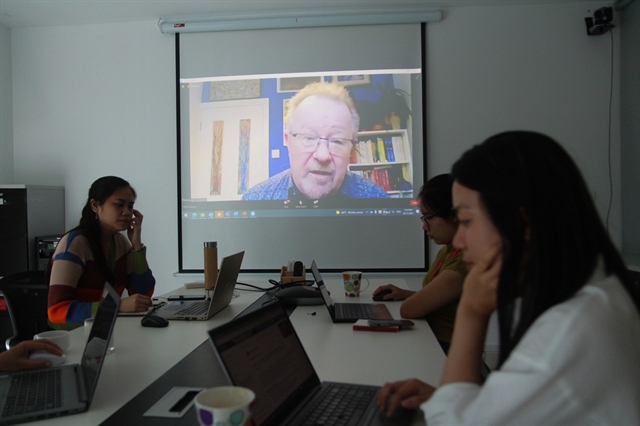 Society
Society

HÀ NỘI — Newly published research by ActionAid, Public Services International and Education International warns that the IMF’s advice to cut public sector wage budgets will have a negative impact on healthcare and education worldwide.

|
| David Archer, Head of Public Services, Civic Participation and Programme Development at ActionAid International, gives opening remarks at the release of 'The Public versus Austerity'. — Photo ActionAid |
The research, titled “The Public versus Austerity: Why public sector wage bill constraints must end”, was unveiled in a global webinar on Wednesday. ActionAid Vietnam also presented their research results in the afternoon session of the webinar.
The research concluded that, although the world is dealing with crises such as “COVID-19, the growing debt crisis, rising inequality, gender injustice and the climate crisis”, austerity policies implemented by governments have hampered the ability to deliver quality public services and solve the aforementioned problems.
“Our research found there was no serious assessment of shortages of key workers in health and education to inform cuts or freezes, and no attempt to project the impact of wage bill constraints. A just, green and feminist recovery from Covid-19 requires more investment in the public sector to create green and decent jobs, especially for women who bear the brunt of the pandemic, economic slowdowns and the climate crisis,” says Julia Sánchez, Secretary-General at ActionAid International.
The research panel noted most concerning austerity policies are public sector wage bill constraints that lead to many public workers being underpaid.
One of the most alarming public sectors affected by these constraints is the medical sector, as pointed out in ActionAid Vietnam’s study of Vietnamese medical workers during the pandemic. A third of medical workers have been subjected to salary cuts and the others have their salary unchanged, despite more than 20 per cent of the respondents saying their expenses have increased.
Trần Xuân Bách, leading health economist and principal investigator of the study, said: “While the previous Article IV document for Việt Nam has advised for wage bill cut, the most recent 2020 Article IV consultation published on 1st March 2021 does not specifically recommend any wage cut. In the short term, the IMF recommend increasing health spending during COVID-19. In the middle term, countries are proposed to set priorities, rationalise the wage bill and allow the automatic stabilisers to work. The current practice of the Vietnamese government can be argued to be much in line with these recommendations by the IMF.”
To make ends meet in the past 12 months, more than sixty per cent of medical workers surveyed have had to borrow money, mostly in the range of VNĐ10 million (US$441) to VNĐ50 million ($2,206). Despite all these hardships and the COVID pandemic, almost fifty per cent of medical workers have to work overtime, and none of the respondents were promoted.
“While people in other sectors can work from home and care for their family, for healthcare providers the work increases and we can not balance work and family duties” – said Đào Việt Hằng, a healthcare worker from the Hà Nội Medical University Hospital.
“Many of us had to go support other provinces for months, and many of us stayed inside hospitals for months.” Hằng’s testimony has been echoed by many other doctors and nurses who have made huge sacrifices during the pandemic.
The research panel recommended “a fundamental overhaul and a system change focused on economic justice. Governments, Ministries of Finance and the IMF need to move more than their rhetoric, and show a real change in practice.”
Some of the recommendations include stopping the pursuit of austerity policies; setting and acting on progressive tax reforms; increasing year-on-year public sector wage bills, and setting fair and gender-equal public sector wages; recognising the public sector workforce as part of the core infrastructure of a country that needs protection and investment, even in recession times; moving towards long-term economic planning that targets people's wellbeing, unrestricted by narrow measures such as GDP growth; increasing transparency and accountability in all national economic discussions whether with the IMF or any other global actor; and disavowing the cult of austerity.
Specifically for the IMF, the panel suggested that the group perform human rights and gender impact assessments on any public sector policy, as well as conducting an independent review of the IMF’s use of public sector wage bill constraints.
The public is also advised to keep governments accountable by means of peaceful protest, should harsh austerity measures be implemented, and gather a collective effort to seek new progressive alternatives to neoliberalism.
But for Hằng and her colleagues, just increasing the wage would not mend the problems caused by the pandemic to healthcare workers.
“There should be programs to improve the situation and support the healthcare providers, not only economically or skill-wise but also in mental health capacity,” she said. — VNS




